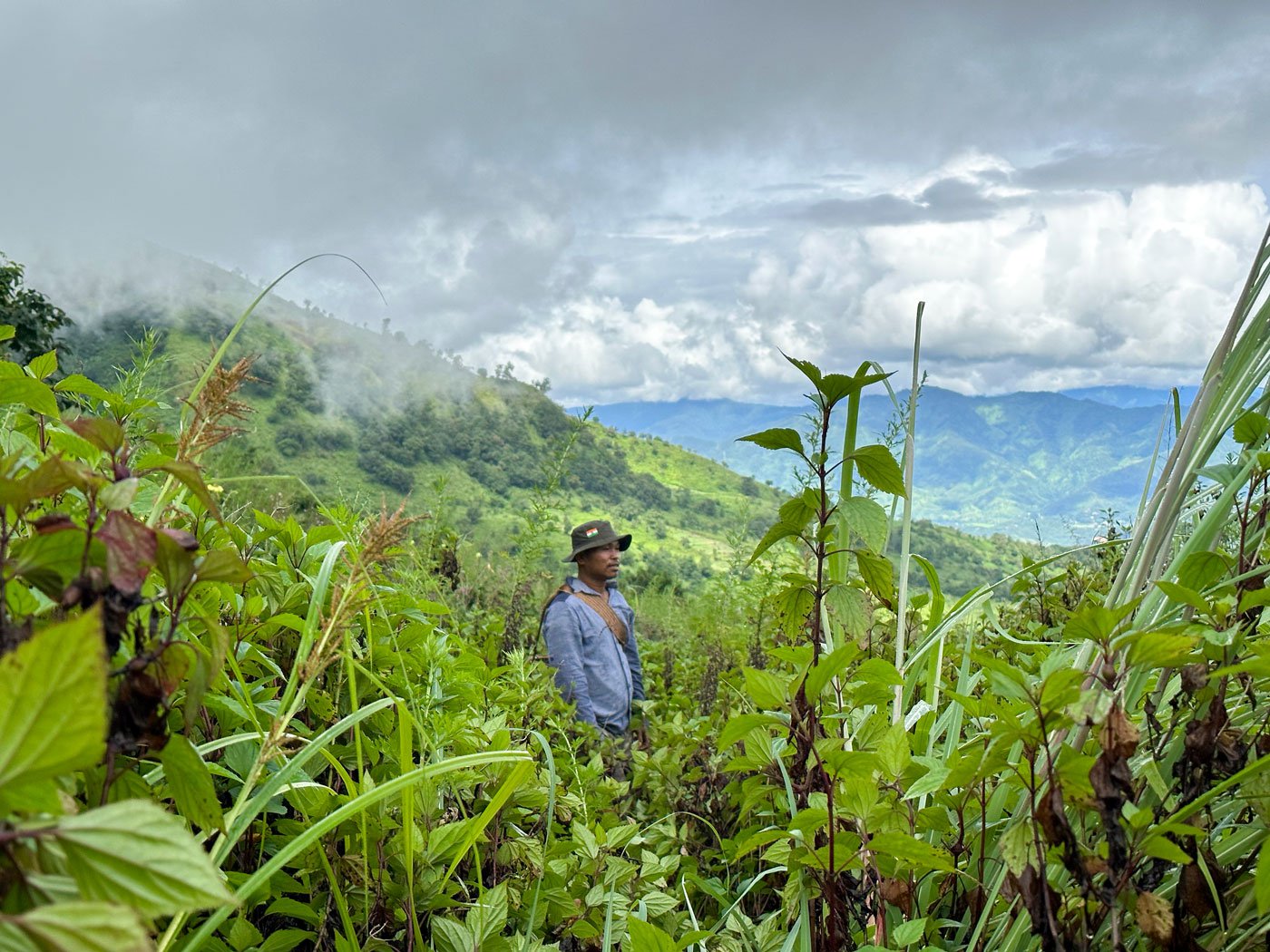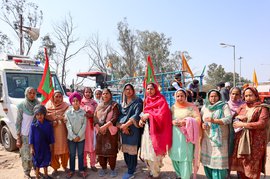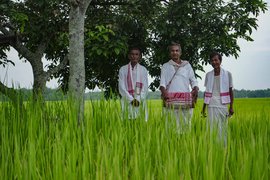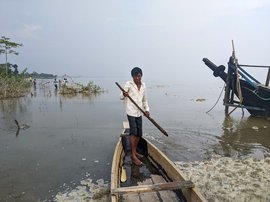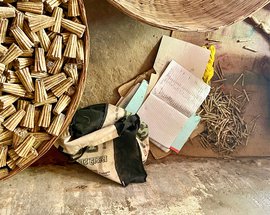Two men are making their way up a hill, cutting through dense thickets as they trek towards their farms in Ngahmun Gunphaijang, a small village of 40 Kuki-Zo tribal households in Manipur's Kangpokpi district. The sky is overcast on this September day in 2023, and all around them is a hillscape overrun with wild shrubbery.
Just a few years ago, though, these hills were covered with striking white, mauve, and pink flowers belonging to the poppy plant (
Papaver somniferum
).
“I used to grow ganja ( Cannabis sativa ) in the early 1990s, but back then, it did not yield much money,” says Paolal, a farmer and one of the men making this journey. “In the early 2000s, people started cultivating kaani [poppy] in these hills. I grew it too,” he says, “up until it was banned some years ago.”
Paolal is referring to the winter of 2020, when S.T. Thangboi Kipgen, the chieftain of Ngahmun Gunphaijang, called for the eradication of poppy farms in the village and urged farmers to cease cultivation altogether. His decision wasn't an isolated one but made in support of the state BJP government’s aggressive ‘War on Drugs’ campaign.
Poppy, from which the highly addictive narcotic opium is made, is cultivated primarily in Manipur's hill districts such as Churachandpur, Ukhrul, Kamjong, Senapati, Tamenglong, Chandel, Tengnoupal as well as Kangpokpi; most of the people living in Kangpokpi are from the Kuki-Zo tribe.
It was five years ago, in November 2018, that the BJP state government under Chief Minister Biren Singh launched the 'War on Drugs'. Singh appealed to village chiefs and churches in the hill districts to stop poppy cultivation in those areas.


Left: Poppy plantations in Ngahmun village in Manipur's Kangpokpi district . Right: Farmers like Paolal say that Manipur's war on drugs campaign to stop poppy cultivation has been unsuccessful in the absence of consistent farming alternatives.
Locals from the Kuki-Zo tribe say that the ‘War on Drugs’ campaign has been a direct attack on them, even fuelling the bloody ethnic conflict that broke out in May 2023 between the majority Meitei community and the minority Kuki-Zo tribals. Although poppy is grown in both Naga and Kuki Zo hill districts, Chief Minister Biren Singh (BJP), locals allege, has singled out the Kukis as responsible for driving the drug trade in Manipur.
The 30 farming households in Ngahmun Gunphaijang, like Paolal’s were forced to give up poppy cultivation and grow vegetables and fruits like peas, cabbage potatoes, and bananas instead, getting a fraction of their earlier earnings. “It was like strangling them,” said Samson Kipgen, acting village chief. Here, the land is community-owned, coming under the stewardship of the village chieftain – a hereditary role passed down in a family. “But they [farmers who switched] understood that it is for the good of the village and the environment,” he adds.
Poppy had been a winning crop for farmers who do not have access to other viable employment opportunities like the Mahatma Gandhi National Rural Employment Guarantee (MNREGA).
The 45-year-old farmer Paolal says that the government’s threat to arrest and imprison cultivators made him discontinue the practice. The campaign warned that if villagers did not cooperate, local police would slash and burn poppy fields. Recently, a valley-based civil society group even went on to claim that the Centre has agreed to conduct air strikes on poppy fields, but there has been no official confirmation of this.
Since 2018, the state government claims to have destroyed over 18,000 acres of poppy cultivation and arrested 2,500 cultivators. . However, data by the Narcotics and Affairs of Border, a specialised unit of the Manipur Police, from 2018 to 2022 shows a total of 13,407 acres of poppy plantations destroyed.
Manipur shares a border with Myanmar, the world’s largest producer of poppy, where the alleged sale and production of other potent narcotic derivatives like morphine, codeine, heroin, and oxycodone take place. This proximity keeps it vulnerable to the flow of drugs and other illegal trade. According to a 2019 survey, Magnitude of Substance Abuse in In dia (Ministry of Social Justice and Empowerment), Manipur is said to have the highest number of injecting drug users in northeast India.
"Was it a fault to start a war on drugs to save the youth?” Chief Minister Singh asked party workers in December 2023, during a meeting at the BJP headquarters in Imphal. He was responding to allegations holding the BJP accountable for the ethnic strife.

Demza, a farmer who used to earn
up to three lakh rupees annually growing poppy, stands next to his farm where he grows cabbage,
bananas and potatoes that he says is not enough to support his family,
particularly his children's education
Ironically, it was the 'War on Drugs' that cost Demza’s children their education.
Until four years ago, Demza and his family lived a comfortable life cultivating poppy in Ngahmun Gunphaijang. After it was banned, Demza moved to mixed crop cultivation and his earnings fell. “If we can cultivate [vegetables] twice a year and get a good yield, we earn up to a lakh [rupees] annually,” says Demza, talking to PARI. “With poppy, we used to make a minimum of three lakh rupees a year despite having only a single harvest.”
This substantial decrease in income has meant pulling his kids out of school in Imphal; he was able to admit only one of them to a local school in the Kangpokpi district headquarters.
Poverty, food insecurity and material needs drive opium cultivation among tribal farmers in Manipur, says a 2019 study on the hill districts of Kangpokpi, Churachandpur, and Tengnoupal. The study was led by Ngamjahao Kipgen, an Associate Professor of Sociology at the Indian Institute of Technology (IIT), Guwahati. He surveyed 60 households and found that a hectare of land produces between 5-7 kilos of opium, which can sell for anywhere between Rs. 70,000-150,000 a kilo.
*****
November is a time of joy for the minority Kuki-Zo tribe as they celebrate the annual Kut festival which coincides with the poppy harvest season. During the festival, communities come together, cook large feasts, sing and dance, and even hold beauty pageants. The year 2023 was different, though. In May, a bloody civil conflict broke out between the Meitei community and the Kuki-Zo, the former comprising 53 per cent of Manipur’s population.
In late March 2023, the Manipur High Court directed the state government to consider a longstanding request of the Meitei community — inclusion in the Scheduled Tribes list, which would provide them with economic benefits and quotas for government jobs. In addition, Meiteis would also be able to purchase land in the hilly areas predominantly occupied by Kuki tribes. The Court’s recommendation was opposed by all the tribal communities in Manipur, who felt that the control over their land would be threatened.

Farmers and residents of Ngahmun village slashing the poppy plantations after joining Chief Minister Biren Singh’s War on Drugs campaign in 2020
This set off a series of violent attacks across the state, including barbaric murders, beheadings, gang rapes, and arson.
Two months before PARI visited the village, a video of a horrifying incident went viral: two women from B Phainom village in Kangpokpi were paraded naked by a mob of Meitei men. The incident occurred during an attack on B Phainom in early May, when it was razed to the ground. After the video was shot, their male relatives were killed and the women were allegedly raped in the paddy fields.
So far, an estimated 200 (and counting) have been killed in the conflict, and over 70,000 displaced, most of whom are the minority Kukis. They have also accused the state and police of abetting Meitei militants in this civil war.
At the heart of the bloody civil war is the poppy plant. “Politicians and bureaucrats are at the top of this chain, as are the middlemen who buy from farmers and make good money,” says IIT Professor Kipgen. Despite the destruction of poppy farms and mass seizures and arrests, he says that the kingpins remain out of the law’s clutches. Most small farmers, Kipgen says, made bare minimum in the poppy trade.
Chief Minister Biren Singh has blamed the conflict on poor poppy growers from the Kuki-Zo tribe, backed by Kuki-Zo armed groups like Kuki National Front (KNF) involved in the narcotics trade across the border with Myanmar. The state government also holds poppy cultivation in the hills responsible for the rampant destruction of reserve forests and the severe environmental crisis in the Meitei-dominated valley.
The poppy cultivation cycle, the farmers say, begins with clearing large tracts of land by cutting down trees and burning forest patches, followed by the use of pesticides, vitamins and urea. This paper published in 2021, says that villages next to newly-cleared plantation sites in Churachandpur district saw the drying up of streams and the rise of water-borne diseases among children in the villages. However, Professor Kipgen said that there is a lack of sufficient scientific research on the environmental impact of poppy cultivation in Manipur.

Paolal harvesting peas in his field. The 30 farming households in Ngahmun Gunphaijang, like Paolal’s, were forced to give up poppy cultivation and grow vegetables and fruits like peas, cabbage, potatoes and bananas instead, getting a fraction of their earlier earnings
The United Nations Office on Drugs and Crime's (UNODC) report on opium poppy cultivation in neighbouring Myanmar found that forest quality deteriorates more rapidly in poppy-growing villages than in non-poppy ones. However, the impact of climate change on both poppy and non-poppy land was seen in falling yields in both, from 2016 to 2018. The fact remains that there is no conclusive data on the environmental impact of poppy cultivation.
Farmer Paolal contests this, saying, “If poppy affected the soil, we would not be able to cultivate this vegetable farm here.” Other Ngahmun farmers say they have had no trouble growing fruits or vegetables despite earlier cultivating opium on their land.
*****
Farmers say that the real problem lies in the lack of state alternatives to the high incomes that poppy gave them. Despite the chief's claim of distributing potato seeds to all villagers, former poppy cultivators like Paolal say they have not benefited. “I barely managed to buy one packet of seeds costing 100 rupees from the market. This is how I grew ankam [vegetables],” he told PARI.
A year after Ngahmun joined the government initiative, the Peh village council in the Tangkhul Naga-dominated Ukhrul district also destroyed poppy plantations in the hills. The Chief Minister swiftly announced a Rs. 10 lakh reward in 2021. The Horticulture and Soil Conservation Department along with the Manipur Organic Mission Agency, are also working with the council to identify beneficiaries and provide alternative livelihood means like kiwi and apple plantations.
In addition to the reward, Moon Shimrah, village chairman of Peh told PARI that the village has received an additional grant of Rs. 20.3 lakh in cash apart from machinery and equipment for ploughing, 80 bags of fertiliser, plastic packaging as well as saplings for apple, ginger and quinoa. “Actually, it was only one household that started growing poppy until the village council intervened and for that, the government has awarded us,” said Shimrah. The government grant would benefit all 703 households in the village, located 34 kilometers from the district headquarters in Ukhrul, where yam, lemon, orange, soya beans, millets, maize, and paddy are otherwise grown.
“However, we request the government to provide us with proper training on the cultivation of these new crops and to monitor the project closely for it to be successful. We also need barbed wires to fence the plantation because our livestock roam around freely and can destroy the crops,” he added.
Kipgen, the acting chief of Ngahmun, told PARI that though his village received one-time support for livelihood alternatives like poultry and vegetable seeds from a state university for research purposes and an MLA, government outreach has not been consistent. “We were the first tribal village in the hills to join the ‘War on Drugs’,” he said. “Yet the government seems to be only rewarding some tribal communities while ignoring others.”
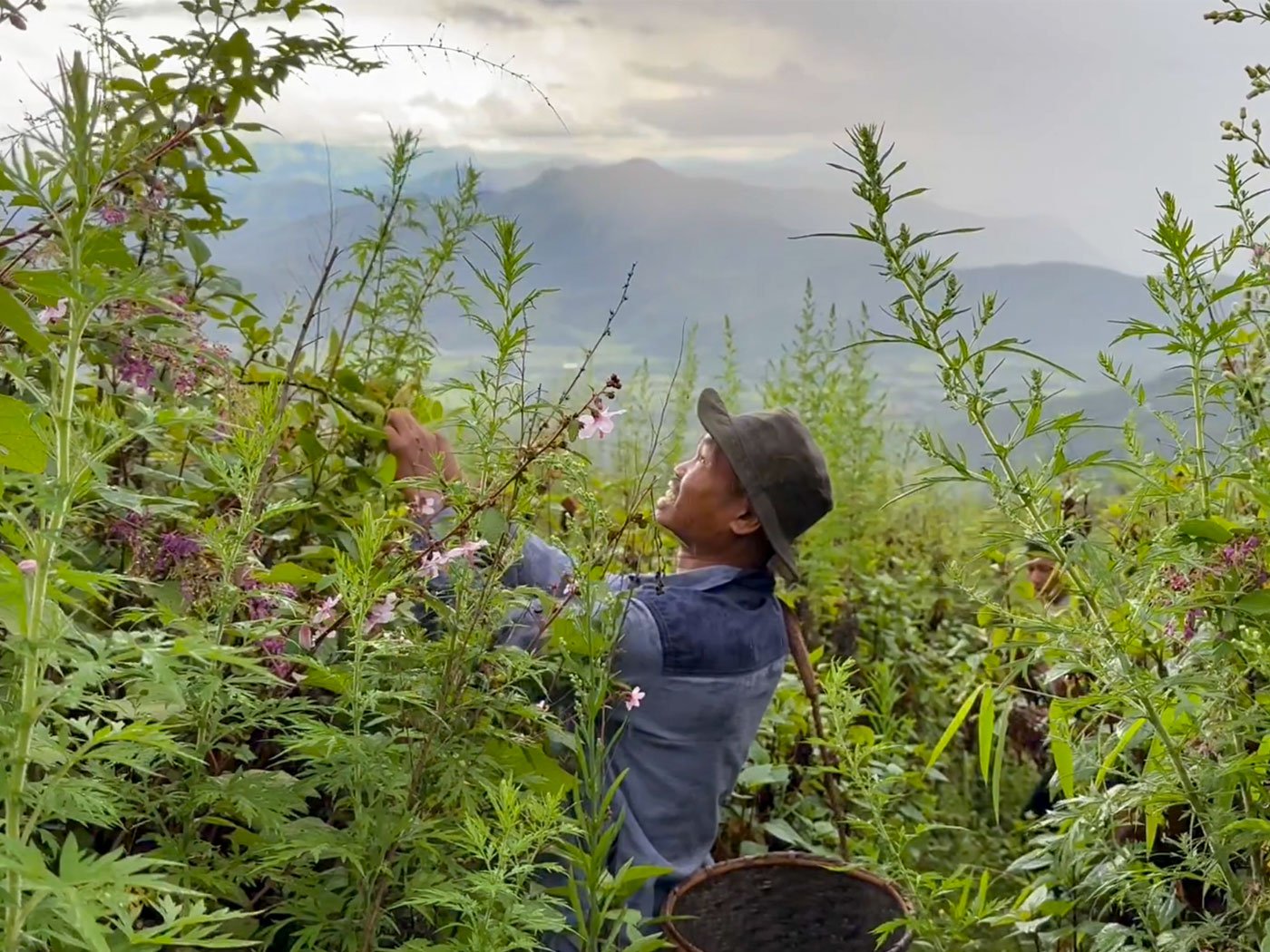
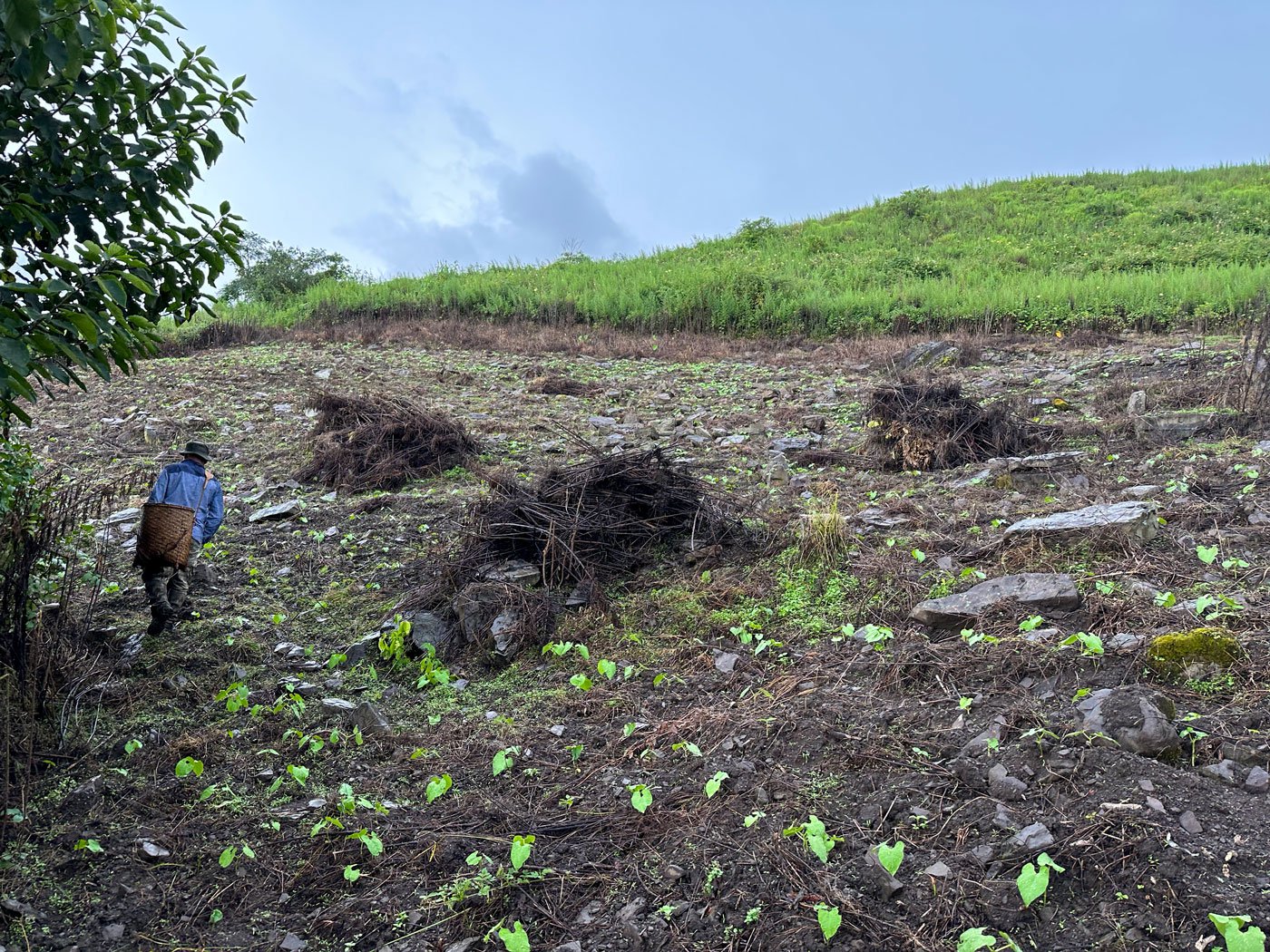
Left:
Samson
Kipgen, the acting village chief, says that switching from poppy cultivation has 'strangled' the farmers. Right:
Samson walks through a
patch of the hill where vegetables like bananas, peas,
potatoes and cabbages are grown
However, sources in the state government pin the blame not on insufficient livelihood alternatives but the model itself. “The hill tribal farmers have collected seeds and poultry but it’s mostly for subsistence farming,” says a source in the Manipur government who oversees livelihood initiatives for poppy farmers in both Naga and Kuki-Zo dominated hill districts.
The income from growing vegetables or rearing poultry, he said, could never match what farmers earned from poppy – an estimated annual income of Rs.15 lakhs as compared to barely Rs. one lakh from vegetables and fruits. Providing alternative livelihoods with poor earnings will not eradicate poppy cultivation. “The ‘War on Drugs’ campaign has not succeeded in the hills,” says the government employee on condition of anonymity. “It’s just an eyewash.”
The forcible eradication of poppy cultivation is meaningless unless replaced by sustainable alternative livelihoods and broad based development initiatives like MNREGA. Not doing this, says Professor Kipgen, will “escalate social tensions, and also create animosity between the local government and farmer communities.”
Even the UNODC report concluded that “opportunities that can help farmers maintain their level of income after stopping poppy cultivation are needed to sustain the effort of poppy eradication.”
The ethnic conflict has only added to the woes of the hill tribal farmers, who can no longer trade or do commerce in the valley.
“After the [annual] poppy cultivation was over we used to make additional income from selling sand from the quarry to Meiteis. Even that is gone now,” says Demza. “If this [the conflict] keeps going on, then a time will come when we won’t be able to keep our children in schools or maintain a livelihood.”
